Facts about Cambodia

The Cambodian government paid US$6-million in compensation for the destruction of the Thai embassy.

Cambodia became known as the site of the "killing fields" genocide from 1975 to 1979, when up to 1.5 million people were murdered by or died under communist Pol Pot's Khmer Rouge regime.

The British Broadcasting Corporation (BBC) reported that corruption is rampant in the Cambodian political arena with international aid from the U.S. and other countries being transferred into private accounts.

Cambodia is divided into 20 provinces (khett) and four municipalities (krong).
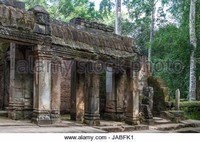
During the third, fourth, and fifth centuries, the Indianised states of Funan and Chenla coalesced in what is now present-day Cambodia and southwestern Vietnam.
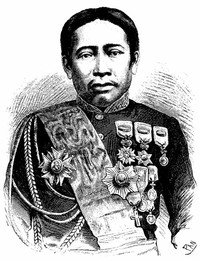
Cambodia continued as a protectorate of France from 1863 to 1953, administered as part of the French colony of Indochina.

Cambodians have exaggerated respect for a small class of civil servants who are perhaps defined more by influence than by wealth.

Cambodia has two rail lines, totalling about 380 miles (612 kilometers) of single gauge track, from the capital to Sihanoukville on the southern coast, and from Phnom Penh to Sisophon.
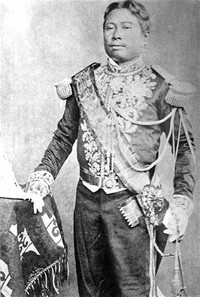
In 1867, the Thai king signed a treaty with France, renouncing suzerainty over Cambodia in exchange for the control of Battambang and Siem Reap provinces.

Most Cambodians are Theravada Buddhists, but the country also has a substantial number of predominantly Muslim Cham.

Cambodia has established diplomatic relations with numerous countries, including the US, Australia, Canada, China, the European Union (EU), Japan, and Russia.

In 1987, the Australian government gave funding to assist Cambodia improve its rice production.

Cambodian cuisine is relatively unknown to the world compared to that of its neighbors Thailand and Vietnam, but has been described not as spicy as Thai cuisine.

Prehistoric Cambodia is sparsely known, as a large area of modern-day Cambodia was under water at 6000 years ago.
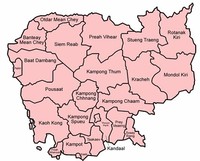
The provinces were ceded back to Cambodia by a border treaty between France and Thailand in 1906.

Cambodian French, a remnant of the country's colonial past, is frequently used in government, but many younger Cambodians and those in the business-class, have favored learning English.

Cambodian modern music is divided into two categories: "Ramvong" is slow dance music, while "ramkbach" is closely related to Thai folk music.

Tourism was Cambodia's fastest growing industry, and the second-greatest source of hard currency after the textile industry.

Angkor Wat, the most famous and best preserved religious temple at the site, is a symbolic reminder of Cambodia's past as a regional power.
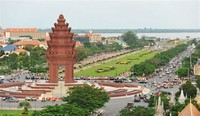
Phnom Penh is the largest population center, with two million of Cambodia's 15 million people.

Estimates of the number of Cambodians killed during the bombing campaigns vary widely.

The recovery of Cambodia's economy slowed dramatically in 1997–98, due to the Asian financial crisis, civil violence, and political in-fighting, but since then growth has been steady.
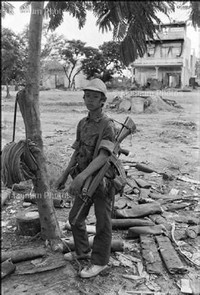
The civil war damaged Cambodia's transport system, despite Soviet help.

Cambodia has two major ports, Phnom Penh and Sihanoukville, and five minor ones.

The Cambodian per capita supply of fish and fish products for food and trade in 2000 was 20 kilograms of fish per year or two ounces per day per person.

Until 1997, Cambodia didn't have a judiciary despite the nation's constitution requiring one.

Cambodia has become a destination for sex tourism, and there is particular concern over child sex and forced prostitution.
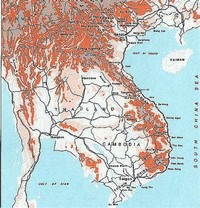
After war-time occupation by the Japanese empire from 1941 to 1945, Cambodia gained independence from France on November 9, 1953.

Modern music is usually presented in Cambodian Karaoke VCDs, usually of an actor, actress or both making the actions, usually by lip-synching the lyrics to the background song.

The bombing continued and, as the Cambodian communists began gaining ground, eventually included strikes on suspected Khmer Rouge sites until 1973.

Despite recent progress, the Cambodian economy continues to suffer from the effects of decades of civil war, internal strife and rampant corruption.

Bonn Om Teuk (Festival of Boat Racing), the annual boat-rowing contest, is the most attended Cambodian national festival.

Cambodia is a member of the United Nations, the World Bank and International Monetary Fund.

The geography of Cambodia is dominated by the Mekong River, colloquially known as Tonle Thom or "the great river," an important source of fish.

Cambodian folk music is influenced by ancient forms as well as Hindu forms.

Norse literature speaks of skrжlingar, most likely an undifferentiated label for all the native peoples of the Americas the Norse contacted, Tuniit, Inuit, and Beothuks alike.

French, once the lingua franca of Indochina and still spoken by some, mostly older Cambodians as a second language, remains the language of instruction in various schools and universities that are often funded by France.

The politics of Cambodia formally take place, according to the 1993 constitution, in the framework of a parliamentary, representative democratic monarchy.

Cambodia has an area of about 69,900 square miles (181,040 square kilometres).

The Cambodia national soccer team managed fourth in the 1972 Asian Cup but development has slowed since the civil war.
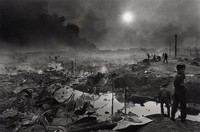
Civil war and its aftermath have had a marked effect on the Cambodian population.


